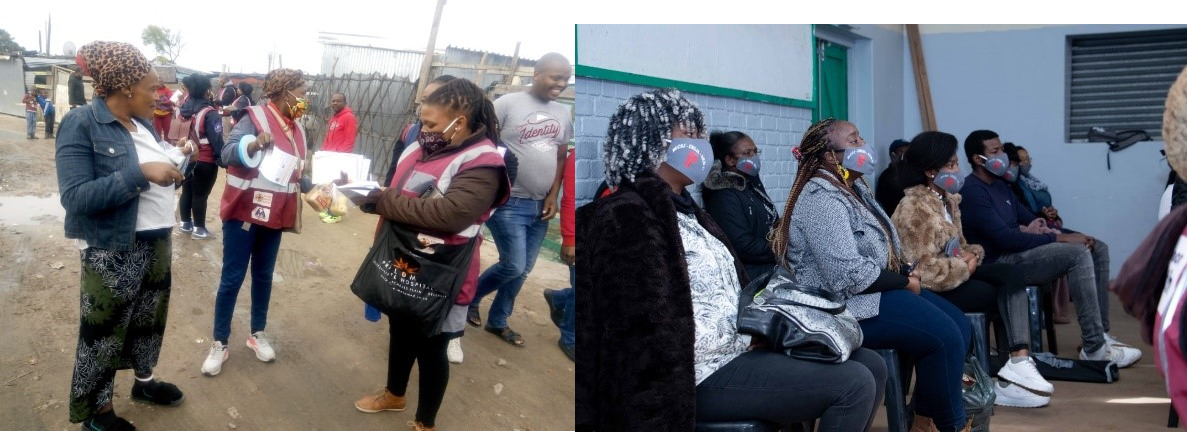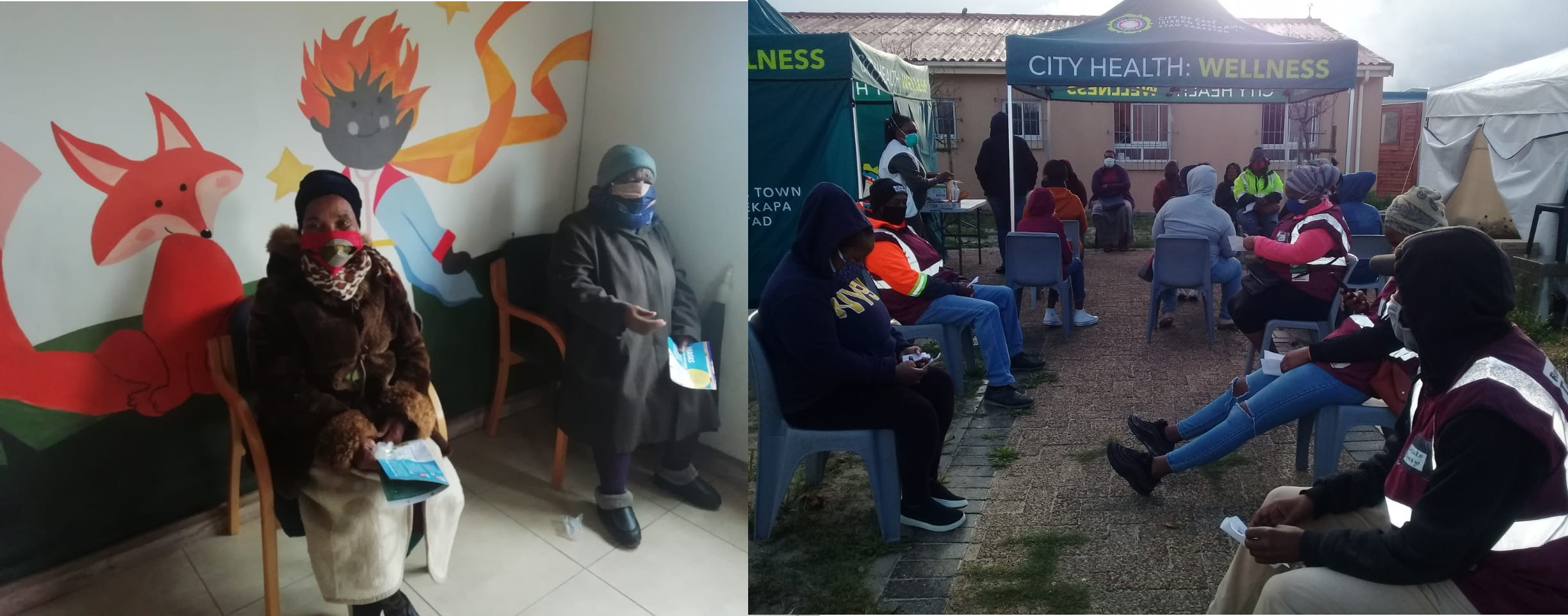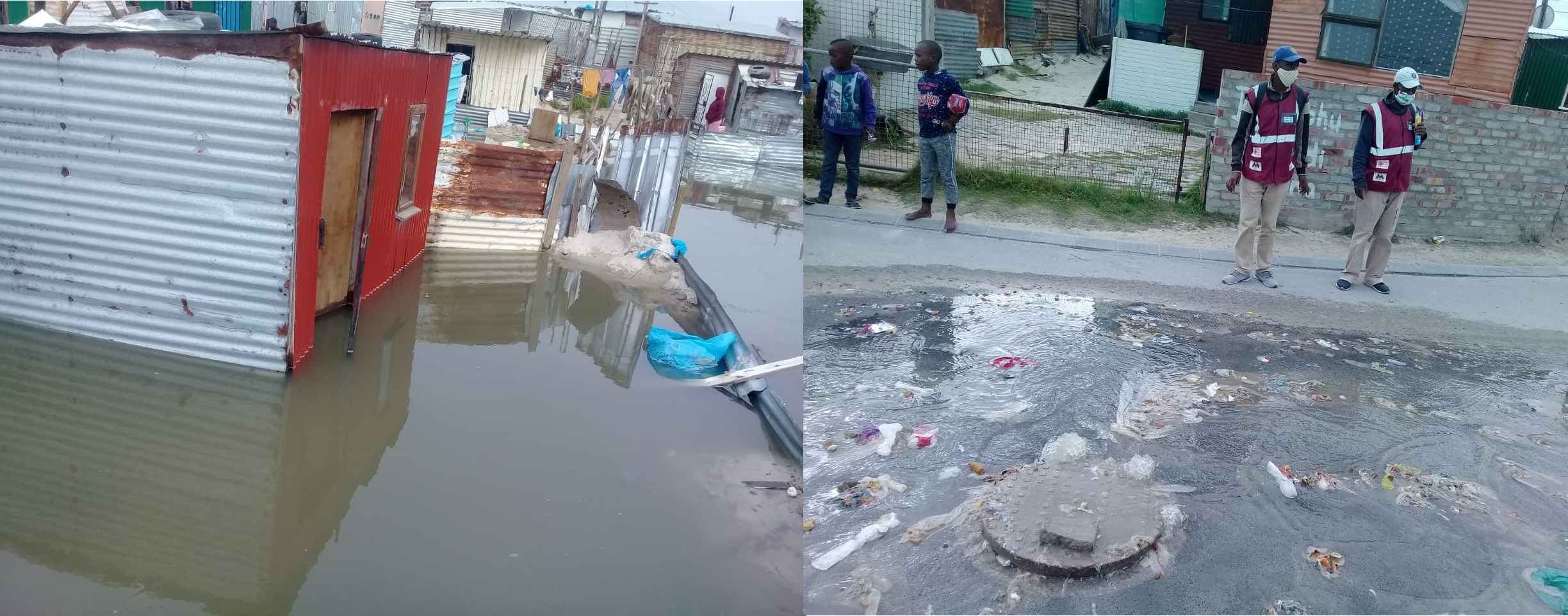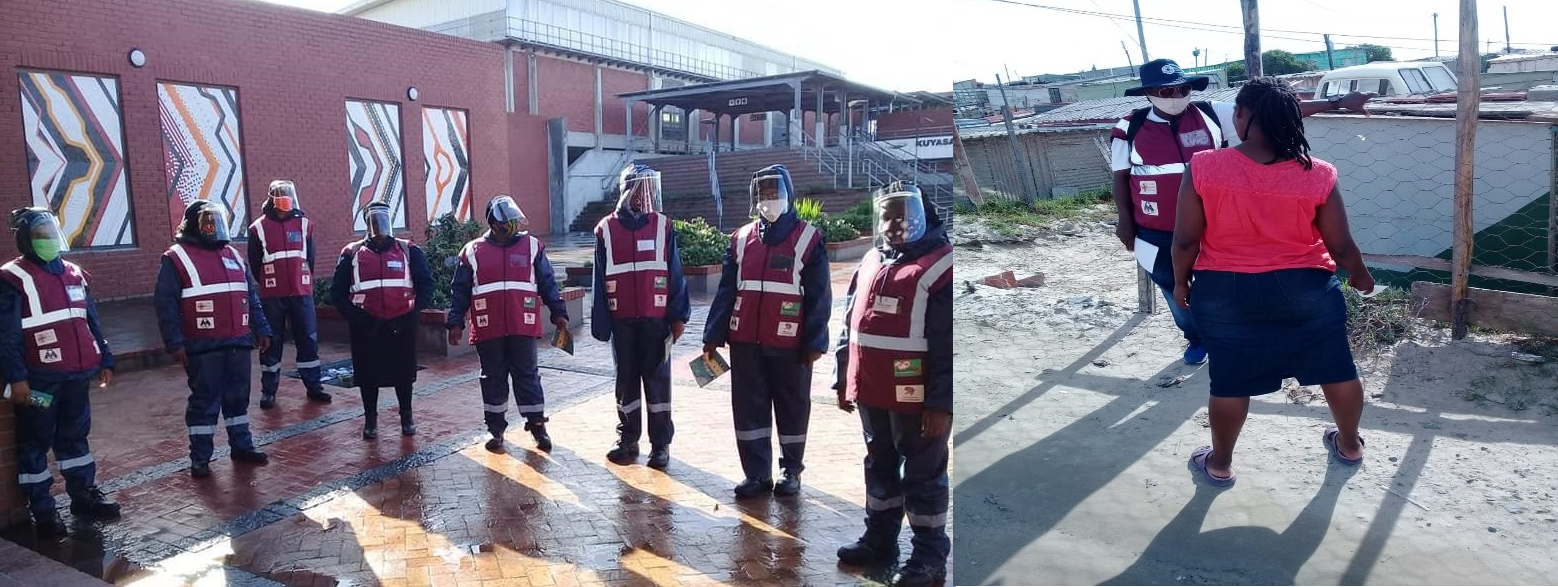The Power and Importance of Community-based Organisations: Initiative and Solidarity

Nonzuzo Mbokazi (Research Administrator, UCT)
Editorial Note: In this article, Nonzuzo Mbokazi, the Research Administrator for the IALARM Project reflects on the importance of community-based organisations coming together and reaching various facets of communities, to enhance education and awareness about the COVID-19 pandemic.
South Africa has been hit hard by the COVID-19 pandemic, leading in the number of confirmed cases of infections and deaths in Africa. South Africa officially implemented the national lockdown on 27th of March 2020, imposing restrictions to prevent the spread of the virus and the potential loss of life. The lockdown has had many implications for the South African society. The economy has particularly felt the crunch, hitting the lowest income groups who work in the informal economy; in essence, no work means no pay. This has culminated in various forms of insecurity reported in low-income areas.1
This article unpacks the Movement for Change and Social Justice (MCSJ) and Activist Education and Development Centre’s (AEDC) community response campaign to the COVID-19 pandemic in the communities of Gugulethu and Khayelitsha. The two organisations have been working closely together in the wake of the COVID-19 pandemic. They have directed their mobilising efforts to conducting community outreach programs such as a door-to-door outreach in areas of Gugulethu and Khayelitsha promoting community health care education on COVID-19, creating public awareness on wearing masks, social distancing, isolation and referrals to health centres as necessary.

Through financial assistance from the University of Cape Town’s [UCT] Division of Social and Behavioural Sciences (DSBS) in the School of Public Health and Family Medicine, University of Virginia, Acacia Global, uMoja for Africa and other funders, MCSJ and AEDC have distributed over 1500 masks to communities and assisted families in need with food vouchers. In their efforts, MCSJ and AEDC members collaborate closely with the Western Cape Department of Health in daily community visits to inform residents about COVID-19. During the four months of lockdown in South Africa the power and importance of community-based programs, their initiative and effectiveness when they come together in solidarity has been strongly demonstrated. This article highlights how the bureaucratic limitations of government have made the response of civil society particularly necessary during this time.
April 2020
MCSJ and AEDC delivered 1200 masks to 12 street committees in Gugulethu, with each street committee getting 100 masks for elderly people, persons with disabilities and pregnant women. It is evident that MCSJ and AEDC have had a wide-reaching impact in raising awareness about the COVID-19 pandemic and consequently, significant strides in containing the spread of the virus in the communities. Furthermore, MCSJ and AEDC delivered R350.00 worth of food vouchers to 25 households in Gugulethu and Khayelitsha, in conjunction with social workers who identified the most vulnerable families in the community.

The government’s response to the COVID-19 pandemic by declaring the pandemic a national state of disaster in terms of the Disaster Management Act (No. 57 of 2002), and subsequently introducing a comprehensive plan to limit transmission of the virus, has been praiseworthy. To mitigate the economic and social impact; a three-phase economic plan to steadily increase economic activity while putting in place non-pharmaceutical interventions to mitigate the spread of the virus.2 Further socio-economic support has been provided to recipients of social grants, through an increase in the cash transfers by South Africa’s expansive social grant programme. The Africa Medical Supplies Portal is an initiative being pursued by the State to ensure access to critical medical supplies and equipment, in an effort to manage the anticipated increase of COVID-19 patients.2 All these efforts are important in the struggle to contain the spread of the virus. However, the work of reaching citizens or community members on the ground has been overlooked. On the national news, interviews with people in low-income communities have featured accounts of people not having access to masks or masks being uncomfortable when worn. Senior citizens have been stressed as a vulnerable group which particularly needs information about COVID-19, the importance of senior citizens being conscientised about the virus and necessary preventative measures has been emphasised by healthcare workers. This is not unique, as many governments have been struggling to respond on all fronts to the COVID-19 epidemic3; the complexity and scale of the epidemic has been immense. Against this background, the response of community-based organisations has been pertinent in bridging the gap where government has not able to have reach and provide support. Community-based organisations have been crucial to the well-being of the South African society, by providing information or providing preventative aids such as masks and hand sanitisers.
May 2020
In addition to their activities in April, MCSJ and AEDC were also able to assist at shopping centres and clinics with queue marshalling and distribution of information pamphlets about the COVID-19 virus, how it is contracted, what preventative measures should be taken, symptoms of the virus and what to do when someone exhibits symptoms. The pamphlets were not only available in English but also in IsiXhosa and Afrikaans. The team of volunteers attended a workshop, hosted by MSF, to ensure that they were well informed about COVID-19 preventative measures. The team was also tested for COVID-19 before going to work in the communities.
Several challenges were faced by MCSJ in the early days of the campaign. Firstly, most pamphlets needed to be translated into IsiXhosa to ensure that people are informed in their mother tongue (for understanding and clarity). Secondly, MCSJ realised that at the Nkandla Endlovini community did not have taps to wash their hands and the water delivery trucks would not always come to the area, making it difficult for people to follow necessary hygiene practices. In response, MCSJ and AEDC contacted the Councillor of Nkanini, who was able to assist in contacting the Municipality to respond urgently to a sewer blockage. The Municipality was also alerted about inconsistent water delivery trucks and lack of at taps Nkandla Endlovini. MCSJ and AEDC’s biggest success is being able to reach communities who have responded well to the information shared with them. Further, community members displaying COVID-19 symptoms were reached by the organisations and referred to receive necessary medical attention.

These accounts demonstrate the vital role community-based organisations play in having a far wider reach in communities. Such organisations have not only facilitated conscientisation and education of people about the virus, which is crucial in order to combat the virus, but also assisted in resolving issues such as the lack of taps and blocked sewage pipes and referring symptomatic community members to healthcare facilities.
June and July 2020
The month of June saw a surge of COVID-19 confirmed cases and related deaths in South Africa, and particularly the City of Cape Town.3 MCSJ and AEDC’s response during this month was just as rapid. On the 9th of June 2020, uMoja handed over 5000 masks to MCSJ and AEDC in Gugulethu at Elukhanyisweni sports centre. The event was attended by 50 people, complying with the restrictions of the lockdown; attendees kept necessary social distance. MCSJ and AEDC proceeded to do a door-to-door campaign in different informal settlements in Khayelitsha.
MCSJ and AEDC have grappled with challenges yet have made significant and meaningful strides in working to educate communities to prevent the spread of the virus. MCSJ and AEDC volunteers were motivated by the support offered through UCT (DSBS) and Acacia Global who donated for protective gears, food vouchers, transport fees and airtime vouchers. Furthermore, the positive response from community members was also a source of encouragement.
Needless to say, the situation has had an immense psychological impact on the activists. A member of MCSJ member explained:
“To date I’ve attended more than 5 funerals and on Saturday I will be attending a funeral at Ny 91 (my street) and on Sunday I will attend a funeral at Ny 53, where we will bury two family members (a mother probably 80 years and daughter probably 58 years). The last time I attended so many funerals it was late 90’s and early 2000 when people with HIV/AIDS had no access to ARV’s. My community is experiencing a culture shock because of the way we are expected to bury our loved ones. Only few people (50) are allowed to come and it is very short process. There is also a real panic from people of picking up COVID 19 at the funeral. I am really worried about losing may old because women we are losing the pillars of our families and communities”.
Despite the hardships of the COVID-19 pandemic, there are several key lessons we can learn from the work of MCSJ and AEDC, such as the relevance and importance of community-based programs, and how crucial they are to the development and care of society.

In July, MCSJ, AEDC, MSF and the Department of Environmental Health provided educative talks to taxi drivers and passengers about COVID-19. HIV self-testing kits, squeeze bottles of hand sanitiser, bleach, mask, sunlight liquid and material were distributed in Khayelitsha Mall taxi rank and Somerset taxi rank. Taxi owners and drivers were in full support when MCSJ and AEDC conducted the outreach campaign at taxi ranks. The organisations also conducted an awareness drive among shop owners in Makhaya and Harare communities, encouraging them to wash their hands (after handling money) and to ensure that they sanitise their counters consistently. The organisations were able to distribute a further 10000 health promotion pamphlets about COVID-19 to the communities of Makhaza, Nkanini and Mitchells Plain. Community based organisations are equipped with the unique experience of working at a household and community level4, and their connections in the communities have enabled them to have a reach and impact necessary awareness and conscientizing about COVID-19.
This article illustrates the important role community-based organisations have played in the local COVID-19 response in South Africa. Considering the humanitarian crisis heralded by COVID-19 and the subsequent national lockdown in South Africa, CBOs have complemented the work of other key players (including government) by reaching communities through innovative means to promote COVID-19 prevention strategies. MCSJ and AEDC have been at the forefront, ensuring the health education, sustenance and relative well-being of people in dire circumstances due to the direct or indirect consequences of COVID-19. MCSJ and AEDC have been working hard to promote the welfare of the communities of Gugulethu and Khayelitsha and neighbouring communities. The national lockdown for MCSJ and AEDC, has been four months of dedication and heavy work to impact and reach the people of Gugulethu and Khayelitsha to flatten the curve.
References
1. Arndt, C., Davies, R., Gabriel, S., Harris, L., Makrelov, K., Modise, B., Robinson, S., Simbanegavi, W., van Seventer, D. & Anderson, L. 2020. “Impact of Covid-19 on the South African economy An initial analysis”. SA-TIED Working Paper 111.
https://sa-tied.wider.unu.edu/sites/default/files/pdf/SA-TIED-WP-111.pdf
2. Tralac. 2020. “South Africa’s policy response to the COVID-19 pandemic”. https://www.tralac.org/news/article/14617-south-africa-s-policy-response-to-the-covid-19-pandemic.html
3. Shepherd, D. A. & Williams, T. A. 2014. “Local Venturing as Compassion Organizing in the Aftermath of a Natural Disaster: The Role of Localness and Community in Reducing Suffering”. Journal of Management Studies. Vol. 51 (6). pp. 951-994.
doi: 10.1111/joms.12084.
4. Lorenzo, T., Hansen, A., Dayal, H. and Gabriels, S. 2020. “Community based workers can help disabled people access services during COVID-19”.
https://theconversation.com/community-based-workers-can-help-disabled-people-access-services-during-covid-19-137090
Author Biography

Nonzuzo Mbokazi is a Research Administrator for the iALARM Project, Division of Social and Behavioural Sciences. She recently completed her Ph.D. on childcare state policy in sociology.
Email: nonzuzo.mbokazi@uct.ac.za